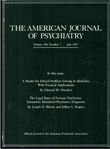The Supreme Court looks at psychiatry
Abstract
An analysis of the attitudes of the U.S. Supreme Court toward psychiatry, as expressed in the Court's major opinions on mental health law from 1975 to 1983, reveals significant discrepancies from case to case. The explanation for these puzzling shifts in attitude lies outside the realm of mental health law, in the justices ' aversion to judicial involvement in professional decision making. A close examination of the cases demonstrates the Court's willingness to alter its rhetoric about psychiatry to support this overriding end. Psychiatrists' understanding of the Court and advocacy for their own and their patients' interests must take this broader issue into account.
Access content
To read the fulltext, please use one of the options below to sign in or purchase access.- Personal login
- Institutional Login
- Sign in via OpenAthens
- Register for access
-
Please login/register if you wish to pair your device and check access availability.
Not a subscriber?
PsychiatryOnline subscription options offer access to the DSM-5 library, books, journals, CME, and patient resources. This all-in-one virtual library provides psychiatrists and mental health professionals with key resources for diagnosis, treatment, research, and professional development.
Need more help? PsychiatryOnline Customer Service may be reached by emailing [email protected] or by calling 800-368-5777 (in the U.S.) or 703-907-7322 (outside the U.S.).



